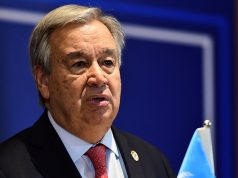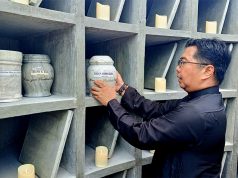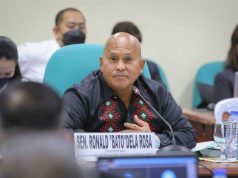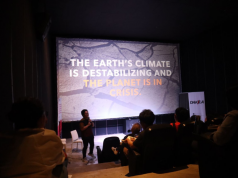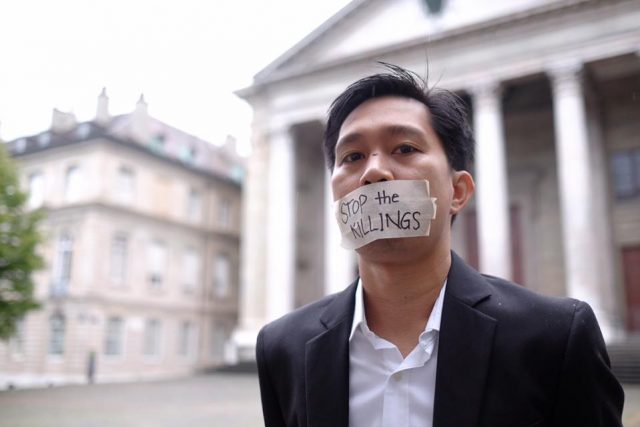
MANILA, Philippines — (UPDATED – 8:21 a.m.) More than 40 countries aired “grave concerns about thousands of extrajudicial killings in the Philippines’ ‘war on drugs’” notwithstanding Senator Alan Peter Cayetano’s attempt to shrug off the deaths as “alternative facts” at the Universal Periodic Review of the country’s human rights record in Geneva, an international watchdog said.
Among these countries are close allies of the Philippines — the United States, Japan, Canada and Australia — and the Holy See.
Filipino human rights advocates also took the government to task, saying its report to the United Nations Human Rights Council “does not fully reveal the reality on the human right situation in the Philippines” and “failed to implement the recommendations” made during the last review of the country’s record in 2012.
New York-based Human Rights Watch, which has been keeping close tabs on the war on drugs being waged by the administration of President Rodrigo Duterte, said “countries from every UN region expressed concern over the deaths in connection with the drug war, with many calling for probes into the killings, and accountability for perpetrators.”
Cayetano, a staunch ally of Duterte who presented the Philippine report, claimed there has been no new wave of killings and called reports to the contrary “alternative facts.”
But John Fisher, HRW’s Geneva director, said: “The Philippines is facing a growing chorus of international concern at the human cost of President Duterte’s murderous ‘war on drugs’.”
“The government’s denial and deflection of criticism shows it has no intention of complying with its international obligations. The Human Rights Council should establish an international inquiry and, if killings without accountability continue, reconsider the Philippines’ council membership,” he said.
The UNHRC secretariat said member-states also recommended that the Philippines “reject any incitement to violence in context of state-sponsored campaign against illegal drugs,” and invite Special Rapporteur on extrajudicial, summary or arbitrary executions Agnes Callamard to visit the country to investigate the drug war killings.
The countries that expressed concern over the drug war killings include:
- Australia
- Austria
- Brazil
- Bulgaria
- Canada
- Croatia
- Cuba
- Czech Republic
- Denmark
- Egypt
- France
- Germany
- Ghana
- Guatemala
- Haiti
- Holy See
- Hungary
- Iceland
- Ireland
- Italy
- Iraq
- Latvia
- Lithuania
- Luxembourg
- Montenegro
- Netherlands
- Norway
- Peru
- Poland
- Portugal
- Romania
- Sierra Leone
- Slovakia
- Slovenia
- Spain
- Sri Lanka
- Sweden
- Switzerland
- Thailand
- Timor Leste
- Ukraine
- United Kingdom
- United States
- Uruguay
- Venezuela
On the other hand, the Philippine UPR Watch, which is composed of human rights groups and advocates, noted that the government’s report to the UN “brags of an economic agenda that is supposed to address various socio-economic concerns,” claimed actions “designed to address the issues and concerns of ‘vulnerable sectors’,” and “denies the existence of a state policy that promotes, condones, sanctions or encourages extrajudicial killings of drug traffickers, criminals or dissenters.”
But UPR Watch’s initial analysis of the report said “the reality on the ground … is not reflective of these pronouncements.”
“Since the first two cycles of the UPR in 2008 and 2012, extrajudicial killings, torture, disappearance and other human rights violations remain unabated,” it said. “To this date, no perpetrator of extrajudicial killings committed under present and past administrations (including Pres. Arroyo and Aquino) has been held accountable. Instead, several military and police officials responsible for human rights violations were promoted to higher positions in the military and police.”
“Socio-economic issues that affect socio-economic and cultural rights have not been fully addressed, and there have been no concrete steps towards this end,” it added.
Despite government’s denial of a state policy on extrajudicial killings, UPR Watch said “the fact remains that 334 activists, human rights defenders, leaders and members of sectoral organizations have been killed under the Aquino administration,” continuing under Duterte, with 55 more political murders.
These do not include the “more than 8,000 drug related killings (that) have been reported.”
It also accused government of using Administrative Order 35, issued by former President Benigno Aquino III, “to provide a legal justification … to deny the existence of drug-related killings.”




